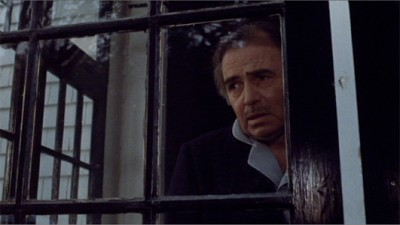Now Playing: Icehockey World Cup
One of the greats among post-WWII Hollywood directors, Sidney Lumet put his name on a very long list of movies with a half-dozen must-see peaks evenly distributed, from 12 Angry Men (1957) through Network (1976) all the way up to Before The Devil Knows You're Dead (2007) released just 2 years before his death.
CHILD'S PLAY from 1972 is undoubtedly one of his least known works, and as far as I can tell has never appeared on DVD*. The fact that the makers of the 1990s horror cult series about the evil Chucky doll didn't think twice about using the same title should indicate the earlier film's obscurity. The two works are completely unrelated, even if they share an occult theme and a creepy undertone.
Based on a Broadway play, Lumet's movie is set at a Catholic boarding school not unlike the one seen in Dead Poet's Society, and the viewer will observe a few, probably coincindental, similarities between the two. The exposition is both promising and effective and shows the presence of a skilled director. When the viewer is introduced to the new young gym teacher (Beau Bridges) it has already been made clear that something mysterious and unpleasant is going on at the school. Hints of evil forces affecting the young students are recurringly planted, as a parallel plot of a power struggle between two senior teachers (James Mason and Robert Preston) is unfolded in a somewhat over-stated manner. The two parallel stories seem to be linked, but the causal relationships remain hidden and disentangling it provokes a certain viewer involvement. So far, so good.
Unfortunately, the transition from play to movie script is far from seamless, creating a movie that works haltingly, in fits and starts, with overlong monologues giving way to moments of brilliance, followed by lots of shots of people running up and down stairs and banging doors. Interesting characters are introduced with fanfare, then given nothing to do. Most problematic is the way Beau Bridges' presumed main character almost disappears about half-way into the movie, only to recur as the final act is set into motion. Some may see this as an improvement as Bridges simply isn't a very good actor, and is given a couple of difficult, rhetoric scenes that he cannot handle well. As Bridges fades out, James Mason takes the center stage with a performance that is on a whole other level than Child's Play in general. In a fully committed effort Mason portrays a stern, traditional Latin teacher who insists on his classic values, both in teaching and in life in general, but is step by step driven towards a breakdown by the harassing 'forces' at the school; forces whose origin he seems to be alone to identify. Unfortunately his part is written too far into melodrama and overstays its welcome towards the end, but this is no fault of Mason's. The lesser known Robert Preston does a good job as a presumed straight-man to Mason's conservative eccentric.

The movie progresses along its uneven trajectory, but does not quite succeed in connecting the mysterious evil that drives the pupils to outbursts of violence with the power struggle between the two teachers. Lumet seems more interested in the letter, and it's possible that Mason's outstanding performance caused a re-balancing of the narrative during the editing. Bridges protagonist is given so little of value to do that he becomes almost superfluous, and there is also a violation of the 'show-not-tell' principle as various side characters discuss the strange goings on. The children are reduced to spooky props, brought out every 20 minutes to enforce the theme of evil in different, sacrilegous ways. One might suggest that the movie had been much more effective if Bridges' character had been replaced with a new student in the class which stands at the center of the goings-on.
The final revelation is hardly a surprise to the viewer as the number of alternative scenarios were few, but thanks mainly to Robert Preston's consistent interpretation of his part, there is still a certain pay-off when the truth is laid bare. The final scenes show that Lumet understands what certain horror directors know to be true: groups of children without adults can be scary. But Child's Play could have made much better use of this asset, instead of sacrificing its initial tone of occult mystery for what is basically a power struggle between two academics. If it had been made the year after The Exorcist instead of the year before, it would probably have been re-written into a more interesting and truly supernatural story.
This was clearly not an important project for Sidney Lumet, who directs it by the numbers for the most part, and actually manages to botch a couple of dramatic scenes that could have been high-points. As often in his movies he seems most at ease in a clearly defined, recurring space, in this case the faculty quarters, where the camera moves elegantly among the tea trays and essays while the overly talky script is acted out. Neither an occult movie nor a particularly rewarding addition to the long line of boarding school dramas, Child's Play is of interest mainly for James Mason's terrific, soul-baring performance, which deserved a more ambitious and better constructed environment. 6/10
*Apparently it's been released on DVD recently.
